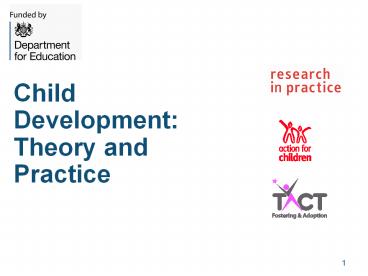Child Development: Theory and Practice - PowerPoint PPT Presentation
Title:
Child Development: Theory and Practice
Description:
Child Development: Theory and Practice * Why is child development important? Evidence that social workers have limited training and knowledge about child development ... – PowerPoint PPT presentation
Number of Views:207
Avg rating:3.0/5.0
Title: Child Development: Theory and Practice
1
Child DevelopmentTheory and Practice
1
2
Why is child development important?
- Evidence that social workers have limited
training and knowledge about child development
(Brandon et al, 2011 Davies and Ward, 2012
Munro, 2011) - Social workers need to be able to
- recognise patterns of overall development
- detect when a child's development may be going
'off track - Knowledge of normal development helps to
understand patterns of abnormal development
3
Why is child development important?
- Good understanding of development can
- help keep children safe
- promote their wellbeing
- assist in assessment
- inform which interventions/support is most suited
- Social workers may need to work with other
professionals with specialist expertise
4
Childrens Developmental Needs
- Many factors that have an influence on child
development - Development occurs in distinct but complementary
domains - health
- education
- emotional and behavioural development
- identity
- family and social relationships
- social presentation
- self care skills
5
Theories of Child Development (1)
- Psychoanalytic (e.g. Freud)
- interprets human development in terms of
intrinsic drives, many of which are unconscious - helps in understanding how personality forms and
develops - provides theory for assessing emotional needs
- Learning Theories (e.g. Pavlov, Skinner)
- explores the relationship between a stimulus (an
experience or event) and a response (the
behavioural reaction to that experience)
6
Theories of Child Development (2)
- Cognitive theories (e.g. Piaget)
- focus on the structure, development and stages of
thought processes and the way these processes
affect a persons understanding of their social
context and environment - Social learning theory (e.g. Bandura)
- learning occurs through direct observation and
modelling (imitation) of behaviour - important in analysing how family processes
influence child development and how individuals
learn and adapt - behavioural interventions and cognitive
behavioural work have been developed from social
learning theory
7
Theories of Child Development (3)
- Ethological theories
- the effect of the environment on development.
Includes John Bowlbys attachment theory - Ecological Theories
- stresses the importance of environmental systems
in development - underpins conceptual frameworks for assessing
children's needs and many community based
programmes
8
Theories of Child Development (4)
- Key concepts
- childrens development influenced by many factors
- each child is an individual
- children develop across different dimensions
simultaneously - children influence their own development through
their behaviour and actions - with support children can recover from adverse
experiences - Developmental psychopathology
- Explores the origins and mechanisms that underlie
mental disorders - Highlights the importance of identifying factors
that explain individual childrens different
responses to specific risks
9
The Role of Parents
- Each theory recognises importance of childrens
environmental experiences on emotional and
behavioural outcomes - parent-child relationship fundamental factor
- parental problems (e.g. domestic violence,
substance misuse, mental health problems,
learning disability) can undermine parenting
capability - parental problems can have long term negative
impact on children's physical, cognitive,
social, emotional and behavioral development - impact of parental problems will vary according
to the age of the child (see Cleaver et al, 2012) - fathers also play important role in childs
social and behavioral development
10
Importance of Relationships
- 'relationships with people who care for and about
children are the golden thread in childrens
lives' (The Care Inquiry) - high-quality relationships matter more than
anything else for children to help them develop
security and resilience - Social workers need to
- nurture positive relationships
- sustain relationships for children placed away
from home - provide long-term help and support
11
Resources A selection
- Cleaver, H, Unwell, I and Aldgate, J (2011)
Children's Needs- Parenting Capacity London TSO - Donnellen, H (2011) Frontline Child development
(chart). Dartington Research in Practice - NSPCC The developing world of the child Seeing
the child. Accessed 18/07/14

